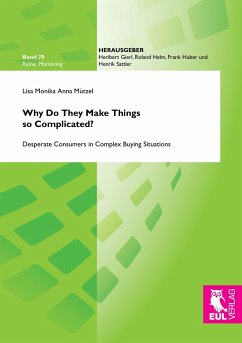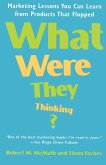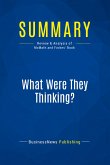In the past 50 years, consumers¿ buying situations have not become easier. Consumers remain easily overwrought by complex buying situations that involve buying complex products or services, such as laptops or insurances. In such situations, consumers find it difficult to make a decision and must spend high levels of cognitive effort on it. Prior consumer research has addressed the complexity of buying situations in several research streams such as in choice complexity or product complexity literature. However, previous researchers have not reached consensus on what constitutes the complexity of a buying situation. Furthermore, they have mostly concentrated on cognitive constructs and emotional constructs have been rather unexplored. To close these research gaps, this dissertation provides an in-depth conceptualization of complex buying situations by developing a comprehensive reference framework. Furthermore, this dissertation differs from prior research by examining in detail negative emotional responses to complexity (NERCO). A reliable and valid NERCO scale is developed that consists of two factors, emotional resignation and fear of post-purchase dissonance. An experiment investigates the influence of two input variables of the reference framework (1. the number of alternatives in the consumer¿s price class and 2. the perceived expertise of the salesperson who provides a recommendation in a buying situation) on perceived choice complexity and on NERCO. This dissertation paves the way for numerous directions for future research on the complexity of buying situations by providing theoretical fundamentals in the form of a detailed conceptualization and by precisely defining the research gaps.
Hinweis: Dieser Artikel kann nur an eine deutsche Lieferadresse ausgeliefert werden.
Hinweis: Dieser Artikel kann nur an eine deutsche Lieferadresse ausgeliefert werden.








